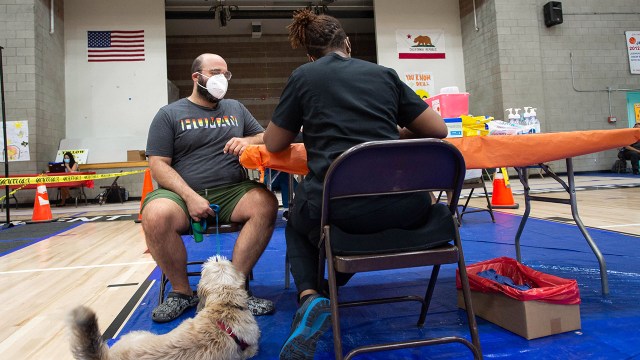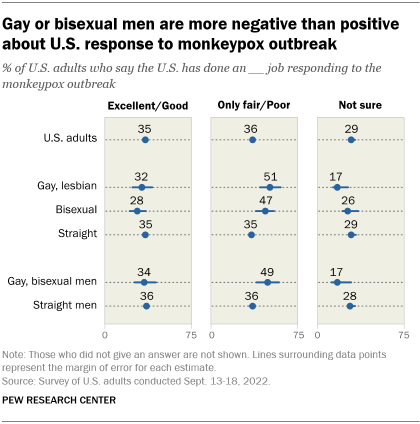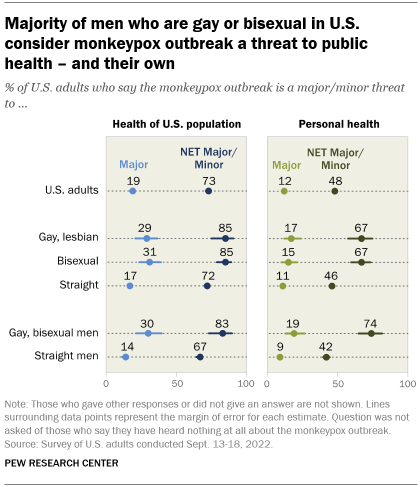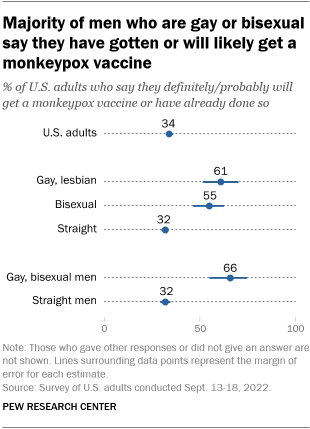
Survey respondents who describe themselves as gay or bisexual men are especially concerned about the monkeypox outbreak and offer a more negative appraisal of the U.S. government’s response than straight men, according to a new Pew Research Center survey. Men who describe themselves as gay or bisexual are also more likely to say they have received or intend to get a monkeypox vaccine.
The United States declared monkeypox a public health emergency on Aug. 4 as cases spread throughout the country following the first reported case on May 17. The vast majority of reported monkeypox cases have been among men who have sex with men. Members of the LGBTQ community have expressed frustration with the government’s response to the outbreak, including the limited availability of vaccines to prevent the disease.
Pew Research Center conducted this study to understand Americans’ views about the monkeypox outbreak. Responses come from a Center survey of 10,588 U.S. adults conducted Sept. 13 to 18, 2022.
Everyone who took part in the survey is a member of the Center’s American Trends Panel (ATP), an online survey panel that is recruited through national, random sampling of residential addresses. This way, nearly all U.S. adults have a chance of selection. The survey is weighted to be representative of the U.S. adult population by gender, race, ethnicity, partisan affiliation, education and other categories. Read more about the ATP’s methodology.
Here are the questions used for this analysis, along with responses, and its methodology.

Among U.S. adults overall, similar shares say that the country has done an excellent or good job (35%) or an only fair or poor job (36%) responding to the monkeypox outbreak, while another 29% say they are not sure, according to the Center’s new survey.
But attitudes differ considerably among gay or bisexual men. Among this group, around a third (34%) say the country has done an excellent or good job handling the outbreak, while roughly half (49%) say it has done an only fair or poor job. Straight men are evenly divided in their assessments.
The vast majority of Americans have heard at least a little about the monkeypox outbreak (94%). Gay or lesbian adults are particularly likely to say they have heard more. Among this group, 40% say they have heard or read a great deal or quite a bit about the monkeypox outbreak, compared with 29% of straight adults. (Read the topline document for additional details.)

Nearly three-quarters of U.S. adults (73%) say the monkeypox outbreak is a threat to U.S. public health, including 19% who say it is a major threat. Most gay or lesbian adults and bisexual adults (85% each) say the outbreak is at least a minor threat to public health.
Gay or bisexual men (83%) are more likely than straight men (67%) to see the monkeypox outbreak as at least a minor threat to U.S. public health. About three-quarters of gay or bisexual men (74%) also say that the monkeypox outbreak is at least a minor threat to their personal health, compared with 42% of straight men.

About two-thirds of gay or bisexual men (66%) say they definitely or probably will get a monkeypox vaccine to prevent the disease, including one-in-ten who say they have already done so. This compares with roughly one-third of U.S. adults overall (34%).
The Centers for Disease Control and Prevention recommends vaccination against monkeypox for those who have been in close contact with someone who has monkeypox; for men who have sex with men; and for those who have had sex with multiple partners in recent weeks, among other considerations.
In a separate question in the Center’s new survey, 38% of gay or bisexual men say they have taken some kind of action to reduce their risk of getting the monkeypox virus. (Read the topline for additional details.)
Note: Here are the questions used for this analysis, along with responses, and its methodology.